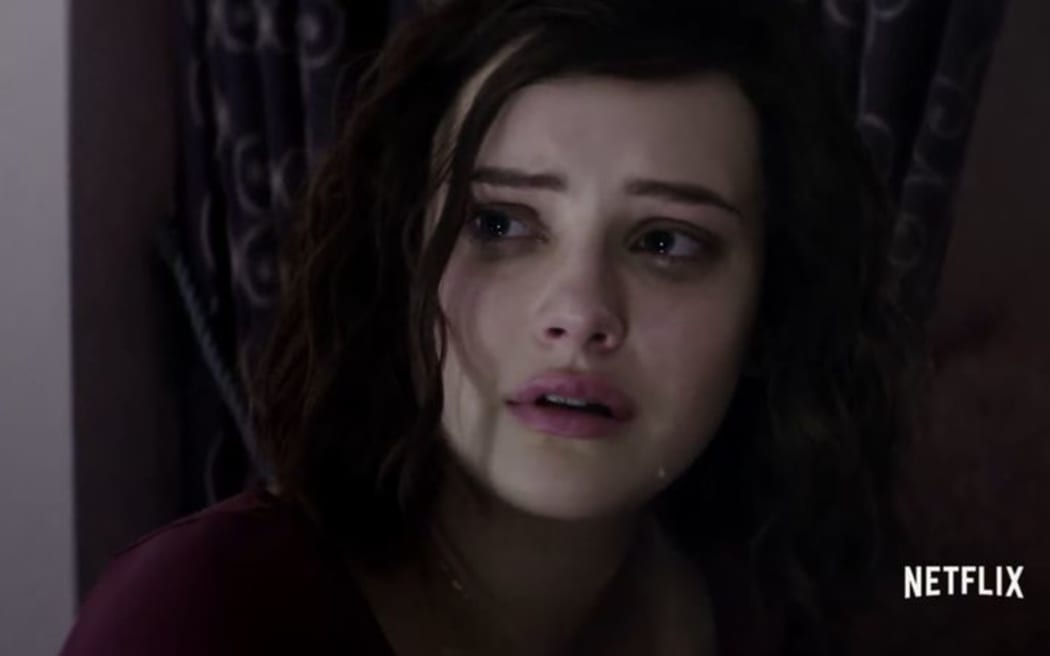It's provoking conversation about mental health, but does the series do more harm than good?

Katherine Langford plays Hannah Baker in the 13 Reasons Why. Photo: Netflix
"Irresponsible, unsafe, and unethical" - that's how the Mental Health Foundation is describing the Netflix series 13 Reasons Why, a story about a teenager who commits suicide.
Since its release two weeks ago it has been the most widely shared streaming programme ever on social media.
But counsellors said the show was putting vulnerable people who are struggling with suicidal thoughts at risk.
The series, based on a 2007 novel with the same name, follows a character called Hannah Baker who leaves behind 13 tapes, one for each of the people she says caused her to end her life.
The series shows two graphic and detailed rape scenes, as well as an unspeakably grim three-minute scene of Hannah's death.
Mental Health Foundation chief executive Shaun Robinson said the show sensationalises, justifies and glamourises suicide and should never have been released. "It's actually quite an unethical programme and it's really exploiting young people and their concerns, and trivialising topics around mental health and suicide."
There appeared no hope of getting help and getting better in the series, and Robinson said he had seen social media posts where people said it was making them feel terrible, depressed and hopeless.
"I am very concerned about the very graphic and detailed portrayal of how Hannah takes her own life," he said. "I'm very concerned that this could seriously put young people's lives at risk."
School counsellor Sarah Maindonald, an executive member of the Association of Counsellors, agreed. "If you've got a 14-year-old girl who's already thinking about [suicide] because her life's pretty miserable - she might be bullied at school, or she hasn't got much support or friends, or she's not very good at expressing herself or asking for help - and she's seeing a glamourous picture in a drama, you know, this girl [in the show] does end up suiciding and leaves notes and suddenly everyone's talking about her and getting this kudos," she said.
"That's a really dangerous message."
Netflix said it consulted several mental health professionals during production, had rated the programme for a mature audience only and had referred it to New Zealand's censorship office.
The company also released an accompanying 30-minute show that delves deeper into the tough topics portrayed, and its website directs viewers to local mental health resources.
Netflix said it supported the unflinching vision of its creators and was proud to offer a platform that could portray undoubtedly tough issues for young adults with complete and uncensored authenticity.
Grace, 17, watched the series with her mum and said most of her friend group had watched the show. It had got them talking.
"Sexual assault and suicide and things, people usually shy away from them," she said. "Especially in friend groups even and in school because they're taboo subjects."
"Having this show so widely talked about has had an effect on a lot of people, it's got people talking in a way nothing else has done up until this point."
Grace said the topic of suicide was such a taboo, teenagers were not given the information or tools they need to confront it. "[I am in] my last year of high school, so it's the last chance people have to guide us and walk with us to teach us these things before we go into the real world."
Youthline chief executive Stephen Bell said everyone needed to grapple with suicide prevention now the show has been released.
"It's come out like this with such stark stories because of the vacuum around the discussion," he said. "I find it really hard to say 'no, it should not have been released' because it's incredibly important for us as a country to start having these conversations.
"To cut through you have to have something that is about the reality. The danger of not talking about this is far greater," he said.
The Commonwealth Secretariat ranks New Zealand 83rd out of 183 countries for teenagers' health and well-being; and it consistently ranks among the worst in the world for its level of teen suicide.
Bell said fixing that required more money and removing the stigma around asking for help.
WHERE TO GET HELP WITH MENTAL HEALTH
Lifeline: 0800 543 354
Suicide Crisis Helpline: 0508 828 865 / 0508 TAUTOKO
Depression Helpline: 0800 111 757
Samaritans: 0800 726 666
Youthline: 0800 376 633 or email talk@youthline.co.nz
Healthline: 0800 611 116
SUPPORT FOR SEX ABUSE SURVIVORS
Rape Crisis national helpline: 0800 88 33 00
HELP Auckland: 09 623 1700
HELP Wellington: 04 801 6655
If it is an emergency and you feel like you or someone else is at risk, call 111.
- A version of this story was first published on RNZ.

